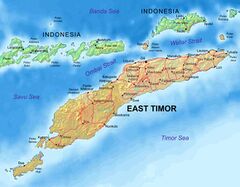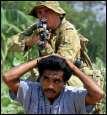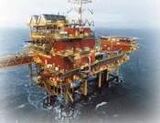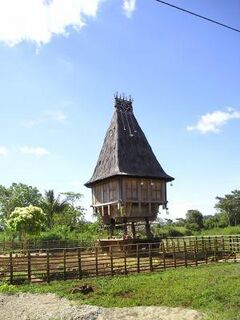East Timor
“It takes a lot to admit you live on the bad side of Timor.”
“I have one of those.”
| |||
| Motto: "Run for the hills!" | |||
| National Anthem: Xanana in Pyjamas | |||
| Capital | Dili | ||
| Official languages | Portuguese, Tetum, Pidgin, Fear | ||
| Government | What day is it? | ||
| Independence | 1999 | ||
| National heroes | Captain D, Xanana "In Pyjamas" Gusmão, Patrick Viera de Mello, Vasco "In Pyjamas" da Gama | ||
| Population | 900,000 (the Javanese killed a lot of them but they reproduce quickly) | ||
| Religion | Roman Catholic | ||
| Economic activity | None | ||
| Currency | Postage stamps, coconuts | ||
East Timor is the world's 2nd to newest country and, like most newborns, it's constantly screaming its tits off so that nobody can get any sleep. Luckily for the rest of the region, though, it's always Australia that has to get up in the middle of the night to burp the little bastard.
East Timor is about half of a piss-ant little island on the edge of Indonesia. It is only about 400 km north of Australia, so the capital, Dili, is by far the closest place to Darwin with more than one pub. Thirsty Darwinians sick of their own locals have been know to catch a dugong across the Timor Sea just to enjoy a change of scene while imbibing a few tall, frosty tins of amber nectar (bloody VB, of course).
As well as being the world's youngest country, East Timor is also the poorest. Australia gives it a little bit of pocket money, perhaps because it feels a bit guilty about having helped itself to the natural gas reserves of the Timor Gap. The East Timorese are proud of the start they've made on their economic development, however, and proudly post their GDP on the national flag at the end of each financial year. At the moment, both GDP and flag stand at 25 cents.
There was much debate about what the flag should look like, but the East Timorese finally plumped for a design that incorporated a split-tailed gecko. This symbolizes the fact that the country could be easily torn in half from the arsehole up at any moment. The East Timorese also showed their self-deprecating sense of humor by adopting the small fry of a local fish as their national animal.
History[edit]
East Timor was founded by the Portuguese in 1552, when Vasco da Gama mistakenly thought he'd discovered Brazil. Or at least Goa. Da Gama's famous quote, Foda-se, digam-me ao menos que é Macau. Ao menos essa merda tem um casino ("For fuck's sake, at least tell me it's Macao. At least that shithole has a casino"), was immediately inscribed in wet cement out the front of the presidential palace in Dili, where it remains to this day.
Over the ensuing centuries the Portuguese had a few gos at trying to make an escudo out of the place, but found that it was about as rich in natural resources as Liechtenstein and that the locals were as about as industrious as the average Australian. Being into white on black action big time, the Portuguese happily shacked up with local ho's, unlike the Dutch or the Brits who kept the native biatches as a tasty bit on the side. If they'd done more of it, Timor would be more like Brazil.
The place was forgotten about again until 1943, when it was rediscovered by Japanese tourists. Overnight it became a magnet for young Australians who liked playing a game called "Diggers, suckers and Nips" with their new Japanese chums. The game itself was a primitive form of paintball but with balls of lead instead of paint, and Mum didn't take you home and make you a nice warm mug of Milo when you got shot in the face. In the spirit of multicultural friendship, the Japanese and the Australians generously involved thousands of East Timorese in the game, even though they couldn't afford to buy their own guns.
The Portuguese came back after the war, and the place regained its status as the arse-end of the Portuguese empire. Portuguese soldiers tried to get sent to Timor instead of Angola or Mozambique. Once they were in Dili, they decided they'd rather come back home to Portugal in bodybags after fighting in Africa than die of boredom.
The joint also served as a dumping ground for convicts, and other people Salazar didn't like - like José Ramos Horta's old man. If they'd done more of it, Timor would be more like Australia, with the whitefellas outnumbering the fuzzy-wuzzies.
In 1955, Timor, along with other colonies, was declared to be an overseas province, in order to give the impression that Portugal não é um país pequeno. - "Portugal is not a small country". That meant children in Portugal were taught that Mount Ramelau was their country's highest mountain, despite the fact it was actually in Timor, unlike Malhão de Estrela, which was in, uh, Portugal.
After the Carnation Revolution in Portugal in 1974, Portugal decided to get shot of the overseas provinces ASAP. In Timor, political parties sprung up, with names like drugs (Fretilin) or chemicals (UDT) neither of which wanted to become part of Indonesia. However, Australian Prime Minister Gough Whitlam decided that he could get into Suharto's good books and said it should go Indonesian.
As a sweetener, he offered the Father of Development the gift of six Australian journalists to be sacrificed alongside the native Timorese. Actually, two of them were Brits and one of them a Kiwi, but because they lived in Oz, nobody in the UK or NZ needed to know.
Ford and Dr. Death (Aka Henry the K) dropped by Jakarta for a chat in December 1975. Ford managed to avoid tripping on any sidewalk cracks. Dr. Death whispered in a monotone into the Father's ear, "what's a commie half island between friends." The Pentagon's re-order window would always be open, he said. Since Suharto was in a hurry, he started using up his U.S. weapons the next day. Dr. Death later said, "Suharto needed East Timor as a bulwark against an Australian invasion. We had to support our ally."
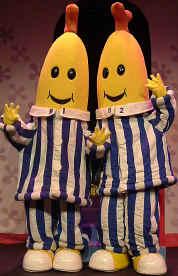
British Aerospace supplied 24 Hawk ground-attack aircraft so that the Indonesians could bomb the bejaysus out of the few Timorese who had managed to high-tail it to the hills, while Wellington played a Mini-Me to Canberra's Dr Evil, by sending diplomats to witness a rubber stamp assembly, which unanimously voted to become the 27th province.
Luckily, one of those who did escape the clutches of the evil TNI (Indonesian military) was Xanana "In Pyjamas" Gusmão, a cuddly cartoon character who kept a warm, fuzzy, romantic kind of fairytale insurgency going for decades. This despite successive Australian governments spending those decades training Indonesia's not-so-warm-and-fuzzy special forces in the art of vigorous interrogation.
In 1989, the Indos thought the place was pacified enough for them to open up to the outside world, only to find that the foreign visitors weren't that interested in seeing the schools, hospitals and paved roads that the Father of Development had given the ungrateful little monkeys, but were instead in finding out how badly they were being treated. In November 1991, one of those Western do-gooders captured a massacre in a cemetery on video, while a couple of others survived being shot dead because they showed their US passports. This is quite possibly the only instance in history in which saying "don't shoot, we're Americans!" actually worked.
In the end (1999) the East Timorese voted yes to the "Bugger off him one fella Indonesia" referendum and declared independence. This resulted in another wholesale slaughter by the departing Indonesian army and local militias. Australian Prime Minister and American Deputy Sheriff John Howard famously sent in the Australian Army to prevent a feared trickle of refugees.
This ushered in a very short UN babysitting mission headed by UN special envoy and former Arsenal footballer Patrick Viera de Mello, who was later killed in a bombing in Baghdad, which, said Osama Bin Laden, was revenge for separating East Timor from the Islamic world. On independence day in 2002, Coffee Annan told the Timorese that he was as excited then as he was when his own country, Ghana, got independence 45 years earlier, despite the fact that the British military actually left the infrastructure intact and didn't tell Coffee he could eat stones before cutting his feet off.
Then the UN lost interest and went home and it was left to shiit Australia to go up there every few hours to stop the little bastard wailing and chucking the toys out of the cot.
Economy[edit]
East Timor is pretty much in a somewhat parlous state economically, especially since Australia pocketed the gigantic Timor Gap natural gas reserves as protection money.
Some analysts believe that East Timor has tourism potential, but that's just bullshit. With all the coups, machete-wielding militias and general lawlessness going on you'd be better off taking your chances with the bombs in Bali or the landmines in Cambodia. And let's face it, there's nothing to do in East Timor anyway. Unless maybe you get off on watching riots and arson.
Even when it comes to simply putting a bit of tucker on the table, the East Timorese are also at something of a disadvantage. They can't even fish because they didn't actually inherit a maritime boundary from Indonesia, and Australia has successfully asserted that its territorial waters go right up to the low-tide mark in Dili.
For refugee purposes, however, the water has been legally excised from the Australian immigration zone, as has the rest of Australia. The only way an East Timorese can apply for refugee status in Australia was to personally knock on the door of Immigration Minister Amanda Vanstone's office in Parliament House in Canberra. Though since it looks like you've had a touch of the tarbrush there, Curly, you won't be getting past the front gate.
The more savvy East Timorese have managed to get Portuguese passports, allowing them to work in factories in the UK. In order to qualify, they must undergo strict language tests, in which they are asked to say "hello" and "thank you" in Portuguese. This is immensely difficult as the Tetum phrases for "hello" and "thank you" are bondia and obrigadu, whereas in Portuguese they are bom dia and obrigado. Consequently, only few are able to get these prized documents.
Politics[edit]
Depending on the day of the week, East Timor is run by Xanana Gusmão (in his trademark uniform of stripey pyjamas), José Ramos-Horta, or some random venal, incompetent, opportunistic scumbag politician (a group of these is collectively known as "a Fretilin"). Conspiracy theorists believe that Australia is the real power behind the "Coconut Throne", but this overlooks the inconvenient fact that the Australian government couldn't organise a piss-up in a brewery. Xanana Gusmão is also the leader of the East-East-Timorese, who are seeking independence from East Timor. Politics will not improve, now the beleagured place is run by a coalition of see what we can get for ourselves and family while the civil service (not) officials still take orders from the venal and the plan is to not have a plan and complicate everything so much you don't have to do any work. Currently Timorese politicians accidentally reading the "what not to do to your new country list" mixed up with "what great things we could do for our new country list". Banana Republic par excellance! Hard to find a country more badly run.
People and culture[edit]
Most East Timorese are Roman Catholic, as if the poor bastards didn't have enough problems already, although at least they aren't Muslims. Or at least, most of them, unlike Super Mario Alkatiri.
Bananas, pajamas and Bananas in Pajamas also play important roles in East Timorese cultural life. The East Timorese affinity for the stripey winter bedwear is a tradition that dates back to the morning that a hung-over Vasco "In Panamas" da Gama first set foot on Timorese soil without getting dressed (he'd been sleeping one off and had to be woken by the bosun when they got there).
Upon independence, Xanana "In Pyjamas" Gusmão declared traditional East Timorese pajamas to be the new nation's national dress. He had personally worn the same pair for the duration of his 25-year guerrilla war against the Indonesian military.
The sanity-testing Australian children's show Bananas in Pyjamas is the highest-rating program on East Timorese television. This is because East Timor is too poor to afford to make its own TV shows and relays the Australian government's Television Free Asia-Pacific propaganda service. Apart from loads of self-serving drivel about how great Australia is (but don't even think about trying to get in there!), all it shows is Bananas in Pajamas and re-runs of Blue Heelers.
Nowadays, the East Timorese society demands new ways of interaction between its youth, which has developed a severe dependence on alcohol, just like their new colonisers (see Australians).
However, the government, focusing their efforts on the urging need to fight back their drunk colonisers, the Australians, asked some Asian countries (such as Malaysia) and African countries (such as Portugal) for help in avoiding having to deal with their youth alcohol dependency. That's why some anti-governmental groups decided to take action and managed to find a new hobby for the young timorese fellows - today, instead of meeting at a pub, they meet nearby houses of pro-government people, specially in Caicoli's and Comorro's areas, and accomplish their new social demands, by throwing rocks and putting them on fire. The World Health Organization already stated that this method of fight against alcoholism made an historically break trough and is already trying to implement it in several other countries with the same problem (like, Australia and Finland).
See also[edit]
| ||||||||||||||||||||


